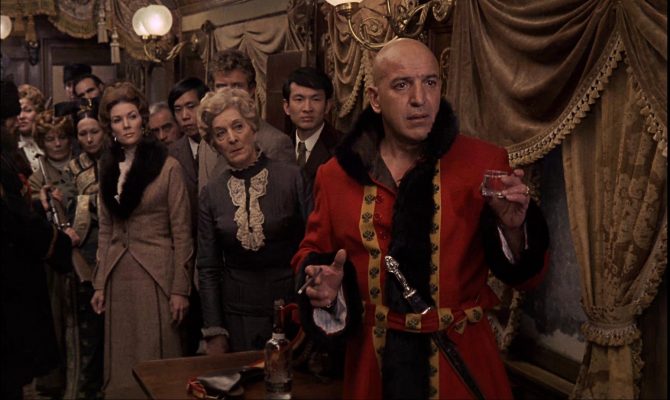Available on Blu-ray Mon 11 Feb 2019
Transporting the frozen body of a hitherto unknown missing link proves more than Professor Saxton (Christopher Lee) has bargained for. His planned low-key return to Britain with his find is beset by local thieves, bureaucracy, spies, professional rivalry in the form of fellow academic (Peter Cushing), a group of crazy Cossacks, and a brain-melting, body-swapping alien life form. Luckily, there’s no obstacle in the world that can stand up to the combined wit, ferocity and stiff upper lips of the pair of Hammer Horror alumni.
Made in Spain during the infamous Hollywood blacklist, Horror Express has the interesting origin of being a film made to order. In fact made specifically to fit the train carriage sets that the producers had made for the earlier film Pancho Villa. It’s not hugely surprising then that the script is a bit of a hodgepodge of ideas, styles and story lines that don’t entirely mesh with much cohesion. However the absolute sense of gleefully silly fun beneath the serious facade involved manages to lash all of the madness together.
The script manages to weave in such a swathe of characters and quirks that things never get dull, or the silly premise too ridiculous. A further masterstroke of pacing is the unexpected appearance of Telly Savalas, as a vodka swigging Cossack captain. He’s 100% energy, bursting into the action, chewing up the scenery and improvising wildly. Something desperately needed in a story that is essentially a conceptual retread of John Campbell’s novella Who Goes There? forced into Murder on the Orient Express.
The new Arrow Blu-Ray release has restored this cult classic to a remarkable extent, with scant few shots showing age or damage. The sound however isn’t quite so great. This is resultant from the fact that almost the entire film has been dubbed in post, and at times the foley leaves something to be desired. The total package is however an absolute must for any fans of the period and style. Including an enjoyable commentary from horror experts and authors, Kim Newman and Stephen Jones, and a series of fascinating archive interviews about the film. Particularly of note are some of the insights into the Hollywood Blacklists and their effect on producer Bernard Gordon, which is a fascinating delve into an important period in Hollywood’s history.
